Demanding tolerance from the barrel of a gun
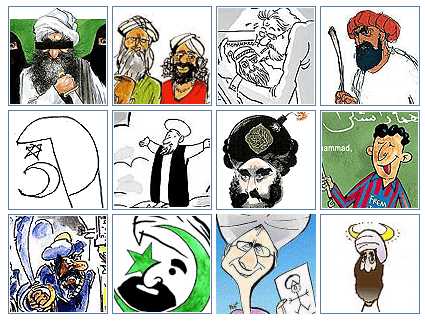
Much has been said over the 12 cartoons (1, 2, 3, 4, 5, 6, 7, 8, 9, 10, 11, 12), but I am partial to Tim Rutten's piece in particular.
Drawn into a religious conflict
by Tim Rutten
Feb 4, 2006
THERE'S a difference between a piece of journalism that unavoidably provokes and one that is merely provocative. So which were the cartoon caricatures of Muhammad published in European newspapers from Bulgaria to Madrid this week?
The cartoons, which really are rather mild little doodles, first were published in a Danish newspaper last fall. Outraged Muslims in the Persian Gulf states launched a boycott of Danish goods that lead the government in Copenhagen to express regret for the offense, but to defend the paper's right to publish. By this week, the Danes were facing not only violent protests in the Islamic streets but also mounting demands from governments in the Mideast and elsewhere that they apologize and do something to the paper.
By week's end, papers and magazines across Europe had republished some or all of the cartoons in a gesture of solidarity with their Danish colleagues and in defense of their refusal to be intimidated out of free expression. Muslim outrage mounted. Palestinian gunmen surrounded the European Union mission in Gaza and others threatened to kidnap Westerners in reprisal. Violence spread and Western diplomats including Kofi Annan and the British foreign secretary began falling all over themselves to apologize for their news media's insensitivity.
All this would be slightly more edifying if it didn't reflect the destructive and dangerous double standard that the Western nations routinely observe when it comes to the government-controlled media in Islamic states. There the media is routinely rife with the vilest sort of hate directed at Jews and, less often, Christians. The "Protocols of the Elders of Zion" remain widely available in countries where nothing is published without government permission, and quotations from that infamous forgery are a staple of commentaries published across the Middle East. In recent years, government-owned television stations in Egypt and Syria have broadcast dramas that repeat the blood libel.
Where were the united and implacable Western demands for apologies?
If you want to see the continuing consequences of this double standard, consider these reactions to this week's events as reported Friday by the Associated Press: In Gaza City, Palestinian terrorists tossed a bomb into the French cultural center. Ismail Hassan, a 37-year-old tailor marching in an anti-European protest there, said, "Whoever defames our prophet should be executed."
Meanwhile, the imam who preached the Friday sermon in Gaza's Omari Mosque told 9,000 worshippers that the cartoonists who executed the caricatures should be beheaded.
In Nablus, the imam Hassan Sharaf told his congregation that, "If they want a war of religions, we are ready."
A split in philosophy
Whatever the religious sensitivities involved, reactions such as these may strike you as threateningly — even viciously — irrational. That's because they are, and there's a reason.
Back in the High Middle Ages, the three great monotheistic religions — Judaism, Christianity and Islam — reached one of those fundamental forks in the historical road. For centuries, a series of Islamic scholars had preserved the works of Aristotle that one day would lay the foundations for the secular logic and science that have made the modern world possible. Their "rediscovery" by medieval scholars provoked a crisis. They recognized that reason was a powerful tool, but were fearful that using it would undermine faith, which was the basis for authority in all three communities.
What to do — or, more precisely, how to think?
Three intellectual giants rose to the challenge. Two of them — the philosopher and jurist Abu al-Walid Ibn Rushd, known to the West as Averroes, and the great rabbi and physician Moses Maimonides — actually were contemporaries, both born in the Spanish city of Cordova. Tradition has it they even met and befriended each other while on the run from the Almohads, Islamic fundamentalists from the Maghreb, who had captured Andalusia and destroyed its storied culture of tolerance. The third was Thomas Aquinas — of whom his admiring coreligionists one day would say, "He led reason captive into the house of faith." Recall that this was an age in which the literate West, not unlike today's Islamists, still regarded theology as "the queen of the sciences."
Averroes' exposition of Aristotle was so widely admired and influential that when Aquinas took it up a century or so later at the University of Paris he referred to Aristotle simply as "the philosopher" and to Averroes as "the commentator." But while Maimonides and, later, Aquinas — who also read and admired the philosopher rabbi — held that there exists a single truth and that faith, properly understood, never can conflict with reason, Averroes took the other fork. He held that there were two truths — that of revelation and that of the natural world. There was no need to reconcile them because they were separate and distinct.
It was a form of intellectual suicide and cut off much of the Islamic world from the centuries of scientific and political progress that followed.
As the events of the last week have demonstrated pretty forcefully, all this is more than an historical curiosity, because the globalization of markets and peoples has brought the rest of the modern world to Islam whether Muslims want it or not. One of the minor paradoxes at work here is that long before the imams' fiery sermons sent people into the streets this week, they'd been whipped into a frenzy by quintessentially modern creations — cellphone text messages and the Internet. Islamic societies are enthusiastic consumers of nearly everything the modern West produces — except such indispensable values as separation of church and state and freedom of expression.
Tolerance goes both ways
The West's current struggle with a murderous global Sunni Muslim insurgency and the threat of a nuclear-armed theocracy in Iran makes it clear that it's no longer possible to overlook the culture of intolerance, hatred and xenophobia that permeates the Islamic world. The hard work of rooting those things out will have to be done by honest Muslim leaders and intellectuals willing to retrace their tradition's steps and do the intellectual heavy lifting that participation in the modern world requires. They won't be helped, however, if Western governments continue to pander to Islamic sensitivity while looking away from violent Islamic intolerance. They won't be helped by European diplomats and officials who continue to ignore the officially sanctioned hate regularly directed at Jews by the Mideast's government-controlled media, while commiserating with Muslims offended by a few cartoons in the West's free news media.
The decent respect for the opinions of others that life in modern, pluralistic societies requires is not a form of relativism. It will not do, as Isaiah Berlin once put it, to say, "I believe in kindness and you believe in concentration camps" and let's leave it at that.
The proof of this is written in the facts on the ground. Across the United States, there are Saudi-funded mosques, teaching that nation's particularly intolerant brand of Islam. There are no churches or synagogues in Saudi Arabia; they're against the law. In Iraq on Friday, the country's dwindling community of Chaldean Catholics prepared for more of the terrorist attacks that have become routine; there were no reported attacks on Muslims in any of the countries where the Danish caricatures were republished. Muslims in those places may have been affronted, but they are not in fear for their lives. No Western leader claims that Ferdinand and Isabella did not expel the Moors from Spain or that there were no massacres during the Crusades. If they did, they'd be howled off the podium and ridiculed into obscurity. The president of theocratic Iran claims that there was no Holocaust and people across the Islamic world applaud.
The European media may have behaved in a provocative fashion this week, but it was provocation in a good cause. The Western governments — ever mindful of their commercial interests — aren't required to endorse what their press has done, but they do nobody a favor when they apologize for it.
(Source)
Here's an interesting video / slide show (2.2 MB) put together by Michelle Malkin:
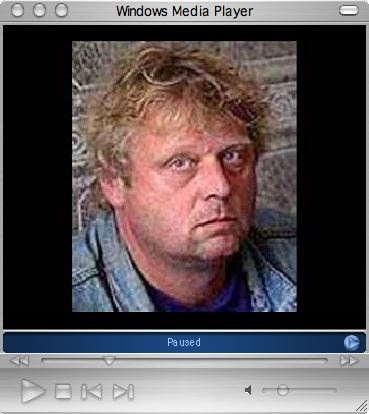
Here's a photo for the day:
 A Jordanian Muslim woman poses with a received message on her mobile phone saying ‘If we keep boycotting Danish Products till next summer they will lose at least 36 billion EURO’, in Amman Jordan, Febuary 1, 2006. A French newspaper reprinted on Wednesday a series of 12 Danish newspaper cartoons depicting the Prophet Mohammad that have sparked protests in the Muslim world and prompted Saudi Arabia to recall its ambassador from Denmark. REUTERS/Ali Jarekji
A Jordanian Muslim woman poses with a received message on her mobile phone saying ‘If we keep boycotting Danish Products till next summer they will lose at least 36 billion EURO’, in Amman Jordan, Febuary 1, 2006. A French newspaper reprinted on Wednesday a series of 12 Danish newspaper cartoons depicting the Prophet Mohammad that have sparked protests in the Muslim world and prompted Saudi Arabia to recall its ambassador from Denmark. REUTERS/Ali JarekjiThat’s a Nokia phone (Nokia is based in Finland) she’s using to send and receive text messages about the boycott. Western inventions—the phone, the cell phone, electronic text messaging—deployed in the cause of destroying Western values.
(Source)
A question: just how sensitive is the Muslim press to others?
If the following cartoon, which is representative of the sort printed in editorials across the Middle East, is of any measure--not at all.
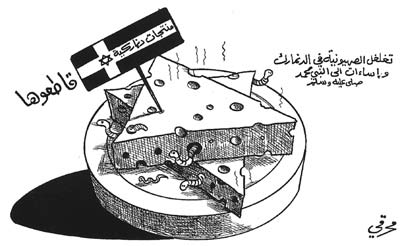 (Source)
(Source)Here are more offensive examples.
Another case of "Do as I say, not as I do"?
Meanwhile, Iran is busy organizing a conference on how the Holocaust never happened and is a myth. And these people are upset over a cartoon?
If kidnappings, fire bombings, riots, and murders are how these people respond to cultures and practices different from their own, it doesn't take a genius to figure out what they will do with nuclear weapons in their hands.
Another pertinent question to consider is this: since when does religious (hyper)sensitivity trump free speech and national sovereignty?
A commenter on another blog wrote: Look, I understand that Muslims are forbidden from depiciting the Prophet because it violates Sharia law. Since when does Sharia apply to those of us who aren't Muslim?
As another individual put it, tolerance exceeds its limits when it tolerates the intolerant.
Remember, due to the publication of The Satanic Verses, Salman Rushdie was forced to go into hiding for a decade when the late Ayatollah Ali Khamenei of Iran issued a fatwa mandating the UK author's assassination.
Now picture Iran with nuclear weapons.
So, tell me, is this the religion of peace?



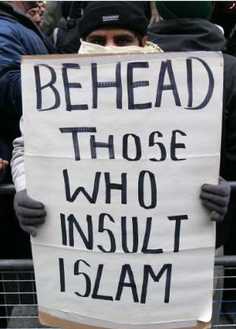


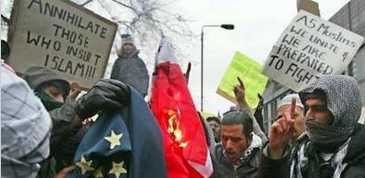
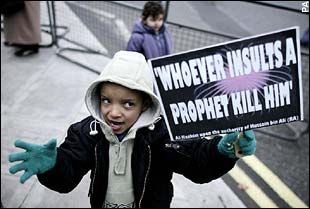
Salaam.
In other news, Kanye West posed as Jesus Christ for the upcoming issue of Rolling Stone:
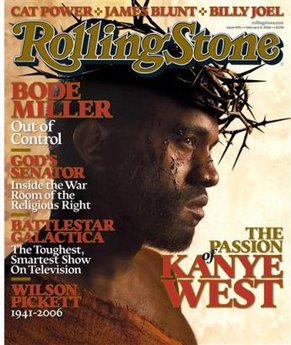
Who wants to bet there won't be riots, fire bombings, kidnappings and calls for murder, mayhem and destruction over this?





